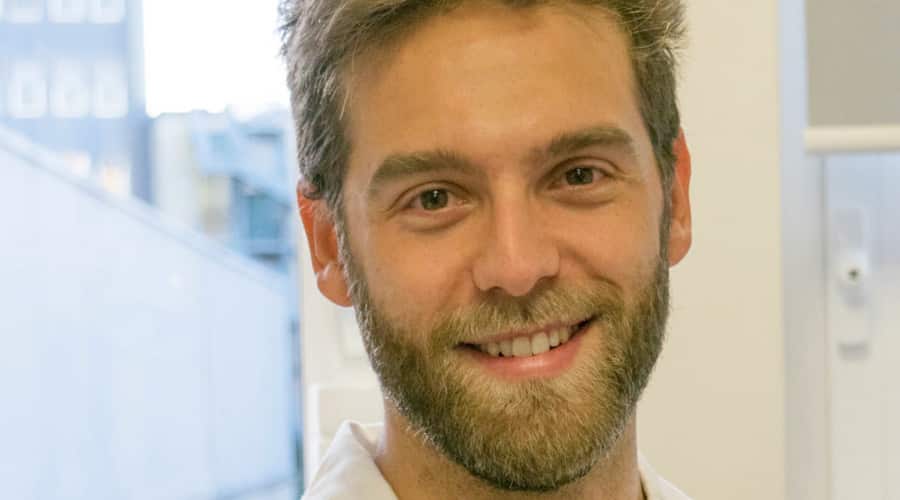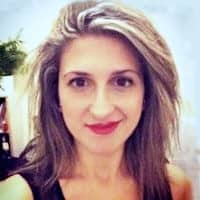#PHDstory | Michele Gabriele


What do you do your PhD in and what is your main research topic?
I work in Giuseppe Testa’s laboratory, in Milan. My PhD project is about disease modelling and epigenetics, which means that I study how neurodevelopmental syndromes and cancer occur, when the mechanisms that regulate where and when genes are expressed are altered. More specifically, I currently study the molecular basis of Kabuki syndrome and Gabriele-deVries syndrome using patient-derived induced pluripotent stem cells (iPSC), which are then differentiated in cell types affected in these diseases, such as neurons. In parallel, I study how the same mutations causative of Kabuki syndrome, when occurring in adults, are responsible for many tumors.
Can you explain to us what are Kabuki syndrome and Gabriele-deVries syndrome?
Kabuki and Gabriele-deVries syndromes are both genetic neurodevelopmental diseases caused by mutations in genes involved in the control of gene regulation. The individuals affected by these syndromes are affected by intellectual disabilities, facial abnormalities, neurological symptoms, and, often, several other systemic problems.
How did you get interested in this particular topic?
When I was in university I got fascinated by the “developmental biology” class, which was about answering the question: “how is it possible that cells of an organism “know” what to become if they all arise from the very same cell and have the same genome?” The topic of gene regulation is exactly the answer to this question and, when altered, gives rise to many pathologies. So, I became more interested in this topic to better understand these mechanisms and to create knowledge that could be used to help people and society.
Tell me more about it.
I was dreaming about becoming a scientist since I was a child when I first watched Jurassic Park. I was Mr. DNA and the scientists that were working there, and I basically decided I wanted to do something similar but more useful! ? I am a very curious person full of enthusiasm for life and I don’t really know how to get bored.
Is yours going to be a new approach?
What I currently do in the PhD project is the latest approach to study human diseases. What I hope is that, in the future, I will develop new effective and easily reproducible approaches that will be adopted widely to help scientific advancement.
Do you also collaborate with other research groups?
I believe that nowadays collaborations are the new and good way to do science. We must let go of the idea of the genius scientist who discovers a new thing by himself. We reached a level of knowledge in which problems need to be addressed in a multidisciplinary approach and often by combining the expertise of several research groups. For example, I collaborate with Nael Nadif Kasri’s team, who has a strong electrophysiology background, and with the geneticist Bert de Vries’s team, with whom we discovered a new neurodevelopmental disorder.
What motivated you to enter this field of study?
I have always been fascinated by neuroscience, since the brain is the most fascinating organ. By studying its diseases, I contribute to give a better understanding of it, to help and to solve problems. For gene regulation is the same; it influences everything, and we still need to understand a lot of fine regulation mechanisms.
What makes you get out of bed in the morning? What inspires you?
I guess everybody knows that the PhD salary is not that great, in every part of the world. I really think that science is a vocation, you need to be curious and love this kind of work. I think I am also lucky that I have a lot of great colleagues, with whom I enjoy my free time and with whom I can have productive conversations that lead to new ideas to be tested. I am mostly inspired by some scientists, who, with their passion and attitude of questioning, had a great impact on our current way of thinking and knowledge. Few examples are Francis Crick and Jared Diamond.
Where do you see yourself in 5 years?
In 5 years, I hope I will have finished my post-doc studies (the career step after the PhD), and be starting my own laboratory. I want to keep all the relationships with all the people I met so far, though. Moreover, among my long and immediate term, I hope to transmit my enthusiasm to the new generations, both in science and out of academia. Therefore, I hope I will manage to do some good science communication.
What makes life meaningful?
Eheh, one of the biggest questions that I think I don’t have a universal answer for. For sure, enjoying everything you do is the key to having a meaningful life. Moreover, I think that it is important to share! Everything becomes more rewarding if you share experiences, moments, everything! Trying not to waste time in the distractions that mislead us and make us waste our time.
What does the world need the most right now in your opinion? What is your dream society?
Again, I think we need to share more and reduce waste and human impact. The world really needs us to stop destroying it and this is linked with my dream society, in which everybody has a good education, that leads to independent thinking, to awareness, and to unity. In my dream society, everybody respects nature and the environment, and we focus on issues that unite people and not divide us.
What does science need the most right now in your opinion?
What we need now is a complete revolution of the publishing and the financial system. Currently, the publishing system is based on peer-revision, which means that anonymous peers, or experts, on the field read your paper and review and criticize your work, to check that everything is correct. This often times doesn’t work in the way it is supposed to work and unpleasant things happen. One signal of change is that several journals have recently started to publish all the review email exchange, to make everything clearer for everybody.
The current publishing system is strictly related to the funding system. Indeed, most funding agencies demand a publishing track record in prestigious journals, and this often creates a vicious circle that fuels the fact that who has money will win more money and who has no money will not probably win new grants because they’re not able to publish. Anonymizing grant applications is another way to evaluate ideas and to give the possibility to non-prestigious teams to win big grants as well. Now, in a scientific world that has become more accessible and crowded when compared to 30 years ago, the combination of these two things creates a lot of negative competition, and a “bad science” behavior caused by the “publish or perish” attitude.

“Michele Gabriele impressed me with his passion about science which was always with him, since he was a child. His view of the publishing system is different but also realistic, a good push to critical thinking about the system itself.”

“Michele Gabriele impressed me with his passion about science which was always with him, since he was a child. His view of the publishing system is different but also realistic, a good push to critical thinking about the system itself.”




